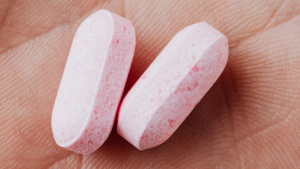
This post contains Amazon affiliate links for supplements our doctors recommend – we earn a small commission too ❤️
✔️ If you think you’ll find this blog informative, make sure to check out our newsletter for more:
What is PCOS?
Polycystic ovary syndrome (PCOS) is a common problem which causes a hormonal imbalance in around 10% of people with ovaries.[1] The name comes from follicles seen on the ovaries, which look like “cysts”, but are actually small fluid filled sacs that contain an egg that hasn’t been released. PCOS typically causes symptoms of irregular or absent periods alongside acne and unwanted hair growth, many other physical symptoms have been reported — from bloating, to fatigue and snoring. You can read more about how PCOS affects The Lowdown community differently through their shared experiences.
How does PCOS affect fertility?
PCOS affects the ability to ovulate (release an egg) which is crucial for pregnancy. Ovulation happens around 14 days before your period, and therefore, regular periods are a good indicator of ovulation. With PCOS, the hormonal imbalance means ovulation often doesn’t happen, which is called anovulation. The mechanism of anovulation is not fully understood. In couples who are found to have anovulation at fertility clinics, 70-80% of them are diagnosed with PCOS.[2]
Irregular or absent periods are a sign that ovulation might not be happening regularly, or at all. And it also makes it reeeaaally difficult to work out your fertile days to have sex if your menstrual cycle isn’t regular.
To sum up, PCOS impacts fertility as ovulation may be unpredictable and sporadic which reduces opportunities for the sperm to meet an egg, which, as we know, is needed for pregnancy to happen.
How can I improve my fertility with PCOS?
If you have PCOS, you can improve your fertility in similar ways to people without PCOS. Lifestyle changes play a huge role in PCOS symptoms, these are often things you can do yourself without involvement from a healthcare professional. Lifestyle changes can also be magical for your fertility, as this Lowdown user found:
Important lifestyle changes to make to improve fertility include:
- Stopping smoking
- Reducing your caffeine intake
- Reducing how much alcohol you drink
- Exercise regularly, but not to excess
- Aiming for a healthy weight
- Use ScreenMe for vaginal health swab tests
Weight loss is often a tricky subject for people with PCOS because the condition itself makes it easy to gain weight and difficult to lose it. Weight stigma is also commonly experienced by PCOS sufferers [3] so it’s frustrating that body mass index known as ‘BMI’, which is a poor indicator of individual health, is used as a criteria for fertility treatment. There is also no evidence that a particular diet (such as keto, calorie counting, Slimming World etc) or type of exercise (high intensity vs. low intensity) is better for weight loss if you have PCOS.[3]
It’s best to find what works for you as an individual, which may be with the support of a dietician or nutritionist specialising in PCOS. Losing just 5% of your body weight can have a really positive impact on your fertility.
You can also take our fertility quiz to see how you can improve your fertility, whether you’re trying right now, planning for the future or just curious!
If you want to have a personalised discussion about the treatments and lifestyle changes for PCOS that might work for you, speak to one of our women’s health doctors.
Which supplements can improve fertility in PCOS?
Anyone who is trying to conceive should be taking vitamin D and folic acid supplements to promote a healthy pregnancy, which are pretty cheap to pick up from many supermarkets and pharmacies.
A popular supplement called myo-inositol has been shown to improve ovulation in some people with PCOS.[4]. You can purchase myo-inositol on Amazon (check out the reviews!)
If you choose to take myo-inositol, another supplement called alpha-lactalbumin can help your body absorb more of the myo-inositol, possibly making it more effective.[5] However, these supplements can be expensive, and you should always talk to your healthcare provider before taking them if you are using any other medications.
How long will it take to get pregnant with PCOS?
The time it takes to get pregnant with PCOS varies between individuals. We’d love to give an answer, but it’s really very difficult to predict because your fertility and when you conceive is down to lots of different factors.
It’s normal for 80% of couples with no fertility problems to take up to 12 months to conceive.
46% of couples with mild fertility problems and 11% of couples with severe fertility problems will get pregnant naturally within 12 months.[6]
Using apps like Ovusense can help you track when you ovulate.
What if I’m not getting pregnant with PCOS?
If you’re not getting pregnant, remember, this could be due to other problems including in your partner, rather than your PCOS. Our fertility specialist nurse can help identify any issues. It can also take a few months for your cycle to return to what is normal for you after coming off contraception, which can be a reason for the delay.
If you are having less than 3 periods a year, then you may be able to ask your GP for referral for fertility support before or when you start trying to conceive. You should also be referred for fertility support after 6 months of trying to conceive if you have PCOS.
In PCOS, lack of ovulation is often the cause of fertility problems. Fertility treatment can induce ovulation through medications such as:
- Clomid which will help between 20 to 50% of couples have a baby successfully with treatment. [7,8,9]
- Metformin. One study suggests up to 8% of couples will have a baby with Metformin alone, but this can be used in combination with other medications. [7,8]
- Letrozole, 28% of couples will go on to have a baby with treatment. [8]
- Gonadotrophin hormone injections with which between 40 to 60% of couples will successfully have a baby.[9,10]
Further fertility treatment includes in-vitro fertilisation or a surgical procedure called laparoscopic drilling which is successful in around 50-60%.[11] There are plenty of options to help and treatment for PCOS associated fertility problems is often really successful.
Where can I get support for PCOS and fertility?
PCOS is a really variable condition which affects some people more than others. We often hear from people that they feel alone and frustrated about the lack of insight from healthcare professionals, alongside limited research for healthcare professionals to base treatment on. That’s why we have our team of women’s health GPs who can listen and provide guidance to manage both symptoms and fertility concerns.
If PCOS affects your fertility, we know it can be incredibly emotionally draining. One Lowdown reviewer said:
This is why The Lowdown PCOS community is a great place to find others just like you, who you can connect with for support and guidance. Check out our PCOS platform and comment on other posts to ask questions, share your own experience to help others.
Tags
- NHS. Polycystic Ovary Syndrome.
- Melo AS, Ferriani RA, Navarro PA. Treatment of infertility in women with polycystic ovary syndrome: approach to clinical practice. Clinics (Sao Paulo). 2015 Nov;70(11):765-9. doi: 10.6061/clinics/2015(11)09.
- Teede at al. International Evidence-based Guideline for the assessment and management of polycystic ovary syndrome 2023.
- Greff, D., Juhász, A.E., Váncsa, S. et al. Inositol is an effective and safe treatment in polycystic ovary syndrome: a systematic review and meta-analysis of randomized controlled trials. Reprod Biol Endocrinol 21, 10 (2023). https://doi.org/10.1186/s12958-023-01055-z
- My Fertility Family. PCOS Supplements.
- Evers, J. Female Subfertility. Lancet. 2002 Jul 13;360(9327):151-9. doi: 10.1016/S0140-6736(02)09417-5
- Legro RS, Barnhart HX, Schlaff WD, et al. Clomiphene, Metformin, or Both for Infertility in the Polycystic Ovary Syndrome. The New England Journal of Medicine. February 8, 2007.
- Legro RS, Brzyski RG, Diamond MP, et al. Letrozole Versus Clomiphene for Infertility in the Polycystic Ovary Syndrome. The New England Journal of Medicine. July 10, 2014.
- Verity Charity. PCOS and your Fertility.
- Weiss et al. Gonadotrophins for ovulation induction in women with polycystic ovary syndrome. Cochrane Database of Systematic Reviews. Jan 2019. https://doi.org/10.1002/14651858.CD010290.pub3
- Debras et al. Ovarian drilling in polycystic ovary syndrome: Long term pregnancy rate. Eur J Obstet Gynecol Reprod Biol X. 2019 Oct; 4: doi: 10.1016/j.eurox.2019.100093














